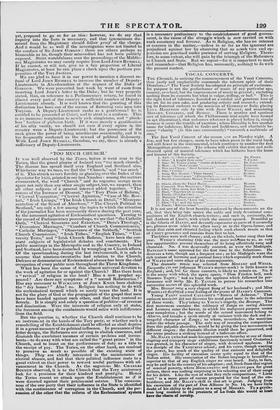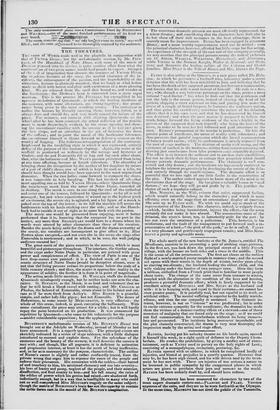VOCAL CONCERTS.
THE Chronicle, in noticing the commencement of the Vocal Concerts, thus justly and emphatically commends the tolerant spirit of their Directors—" The Vocal Society has adopted no principle of exclusion. Its purpose is not the performance of music of any particular age, country, or school, but the improvement of music in general ; excluding nothing from its concerts but what is vulgar, trifling, or bad." This is the right kind of tolerance, founded on a cordial and generous love of the art for its own sake, and producing activity and research ; extend- ing its fraternal embrace to the musician of Germany or Italy, placing Luca Man ENzio side by side with JOHN WILBYE, and associating Mozart's, CIMAROSA, and Bimini.. There is another and spurious sort of tolerance (of which the Philharmonic trial might have formed an apt illustration), that welcomes whatever is placed before it, simply because it saves the trouble of exertion ; whose liberality is but another name for indolence, blind to faults and feebleness, and charitable be- cause "charity " (iii this case conveniently) "covereth a multitude of sins."
The first Vocal Concert of the season wns on Monday night. A few, and but few changes, seem to have taken place in the vocal band, and still fewer in the instrumental, which continues to number the first Metropolitan professors. The scheme will exhibit that true and well- directed spirit of musical tolerance which has hitherto been the boast and honour of this Society.
1. Antli on." God is gone up" Dr. CROFT.
2. Glee, - A knight there came" T. COOKE. 3. Song. Mr. PARRY j anior, "sisters of Acheron" Dr. CALLCOTT. 4. Math al, "Sister awake" HATEsorr.
5. Trio and Chorus, " Sicut locutus est " FENOGLIO. 6. Ode, "Cecilia" sE:rE.. 7. Sono, Mrs. Bisuor. "There blooms" 8. Scene, "Sweet peace" (Euryanthe) WEBER. 2. Duetto Cuucertaute, Messrs. Nmum.suic and WILLMAN.
10. Gloria, (from the Third Mass) HAYDN.
11. Canzonet, Miss WOODYATT, " The season conies " ... • iI ATOM. 12. Glee," How sweet, how fresh" 1 AXTON.
13. Duet." Together let us range" Dr. liorez.
14, Finale, (Cusi fun tstte) MOZART. 15. Madrigal," Flora gave me" WILBYE.
16. Aria, Mr llai.FE," Mete voci" NI liCADANTE.
17. Glee," Up! quit thy bower!"
18. Finale," ltitorna ormai "
It is not one of the least benefits conferred by these concerts on the art, that they bring into notice the noble and truly devotional com- positions of the English church-writers; and such is, eminently, the full Anthem of ClisaFr, with which the concert opened. Beautiful as is the Gloria of HAYDN, and devoutly expressive as parts of it assuredly are, phrases occur which too often carry us to the Opera-house, and break that calm and elevated feeling which such church music as that of CROFT generates and sustains from first to last.
The Glees were well chosen ; and, on the whole, better sung than last year. WEBBF's charming Ode was the more welenne to us, as very few opportunities present themselves of its being effectively sung and chorused. No. 4 was deservedly encored, as were the Madrigals. BATESON'S name appeared for the first time in the Selections. He deserves a turn, though not a frequent one ; as his Madrigals want the rich texture of harmony and poetical fancy which especially mark those of WILBYE and some other of his contemporaries. The dramatic music was selected from MOZART and WEBER. Eurganthe (in our judgment WEasn's master-work) is little known in England ; and, but for these concerts, is likely to remain so. No. 8 is the scene with which the opera opens, " Dem Frieden bell, mach Sturmes Tagen incite " and we hope the applause which followed its per- formance will ncite Mr. E. TAYLOR to pursue his researches into
successive scenes of this splendid work.
Mrs. BISHOP sang a very elegant Song of her husband's ; and Miss
WOODYATT displayed a true feeling of the graces of HAYDN'S Canzonet.
Young PARRY revived CALLcorr's " Sisters of Acheron." That eminent musician did not discover his usual good taste in the selection of these words. They belong to YOUNG'S tragedy, the Revenge. The first movement contains the soliloquy of Zanga on seeing Alonzo and Leonora enter the bower, in which his malignant purpose seems near completion ; but the words of the second movement belong to Alonzo, and breathe a spirit utterly at variance with the dark and re- vengeful character of Zanga ; to whom, nevertheless, the musician refers the whole passage. The only way of rescuing the composition from this palpable absurdity, would be by giving the two movements to different singers : the dramatic illusion would then be preserved, and the scene produce a striking instead of a ludicrous effect.
Mr. BALFE (who had made his appearance on Saturday at one of those claptrap and trumpery stage exhibitions facetiously termed Oratorios) was greeted, in his character of singer, with deserved applause. He is a disciple of the TAMBVRINI school; and his voice, though wanting
the power, has much of the quality of that eminent and delightful singer. His facility of execution seenis quite equal to that of the Italian artist. His enunciation of the Italian language is beautiful— superior to that of any English singer we ever heard. Italy, in fact, may be said to be the country of his adoption ; and, fresh from that region of musical poverty, where lUERCADANTE and BELLINI pass for great writers, there was nothing surprising in his selecting one of their songs for his debut. Like the rest of what they style compositions, " Liete voci " is a mere piece of canvas prepared for the hand of the em- broiderer, and Mr. BALFE'S skill in that art is great. Judging from his execution of the part of' Don Alfonso in No. 14, we have little doubt of his ability to do Justice to a song of MOZART. To a gentle- man long resident in the precincts. of La Scala this would at least have the charm of novelty.
The msly iaausursestud e wash Concerottite •Duet by NiotioutoN
and WILLMAN,-..one of t ',roost finished performances of its kind we ever heard. - - -4.1Wilkidt.K44, "."
The room, consider ingthat " no' ody has et come to town," was well filled ; and the cone Jrt:seemed to he thoroughly enjoyed by the audience.































 Previous page
Previous page